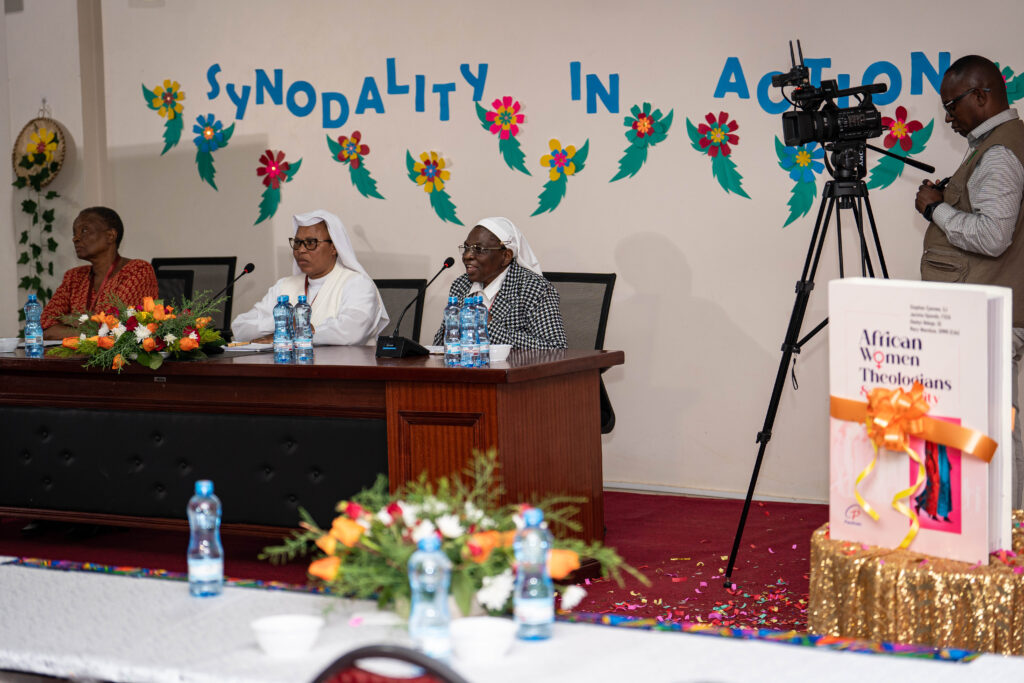
Day two of the Second Conference on African Women Theologians set the pace for the conference as keynote speakers Prof. Teresa Okure, SHCJ and Prof Mary Getui women leadership in different perspectives. Prof Okure’s topic was Discovering and Rooting the Vitality of Women in the Scriptures: The need for new reading eyes. In her address Prof. Teresa Okure explored the vitality of women in the Scriptures as a foundation for true synodality and leadership in the Church. She challenged long-held interpretations that marginalize women, urging a fresh, Spirit-guided re-reading of the Bible that reveals how women have always been active, indispensable, and chosen by God in salvation history.
Through examples from both Old and New Testaments — Eve as life-bearer and hope, Ruth as a model of love, women who saved Moses, Mary the mother of Jesus as the faithful companion, Elizabeth’s prophetic role, Mary of Magdala entrusted with the Resurrection message, Lydia as the first convert in Europe — Prof Okure demonstrated that women have been central to God’s work from the beginning, often breaking cultural and religious barriers.
Her core message: women need not wait for permission or positions; God has already included them. The Church must return to Christ, the Scriptures, and the Spirit to rediscover a new humanity where male and female, Jew and Gentile, slave and free are one (Gal 3:28). Synodality must honor this equality, not as concession, but as God’s design.
Prof. Mary Getui whose topic was Discerning leadership in the model of motherhood explored leadership through the lens of motherhood and Mother Nature, linking it to synodality and the Church’s mission. She described mothers as natural leaders whose qualities — care, courage, balance, and resilience — provide lessons for reimagining leadership. Using stories of a snake beside a baby, Mother Hen in a storm, and Mother Eagle teaching her chick to fly, she illustrated protection, sacrifice, risk, and the importance of empowering others.
She highlighted current leadership challenges: short-sightedness, materialism, competition, exclusion, sexism, and power clinging, urging leaders to self-lead, include others, respect diversity, and provide hope and companionship. Finally, she called on the Church, viewed as “mother,” to treat the vulnerable, the young, and the different with dignity, rethink stereotypes, and embrace a leadership model rooted in care, balance, and shared responsibility.
Other presenters for the day included Dr. Hadebe Nontando, Ph.D. from the University of Free State South Africa who presented on Synodality, male-only leadership and the rise of women’s political leadership in Africa: A challenge to African Catholic Women Theologians; Sr. Gesela Rfanyu Shey, MA whose topic was Counselling as a path to healing in a synodal Church: An African Perspective; Ms. Suki W. Nyadawa, MA from KCA University Kenya who presented on Reimagining leadership interpolated by poor governance: Addressing sexual and gender-based violence in institutions of higher learning in Kenya; Sr. Dr. Maria Natalia A. Ajayi, IHM, PhD from the Catholic Institute of West Africa (CIWA) Port Harcourt, River State, Nigeria who presented on Leadership Styles of Immaculate Heart Sisters: Umauda Jesu Turning Challenges to Opportunities in Community Living; and Sr. Dr. Mercy Shumbamhini, CJ, PhD who is a part tiem lecturer at Arrupe Jesuit University, Zimbabwe. She presented on Recognizing the importance of safety for all in the Church: A holistic approach.
By Pamela Adinda, HUC Communications Department Coordinator
